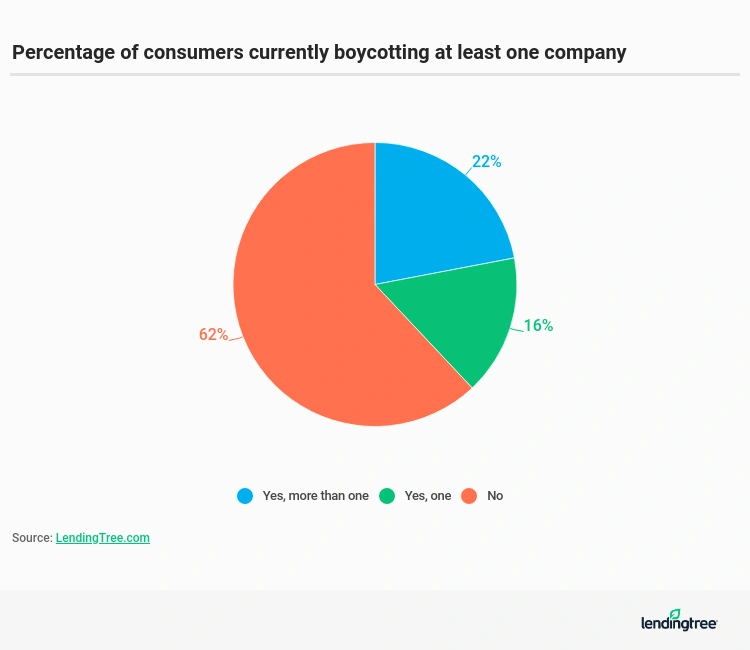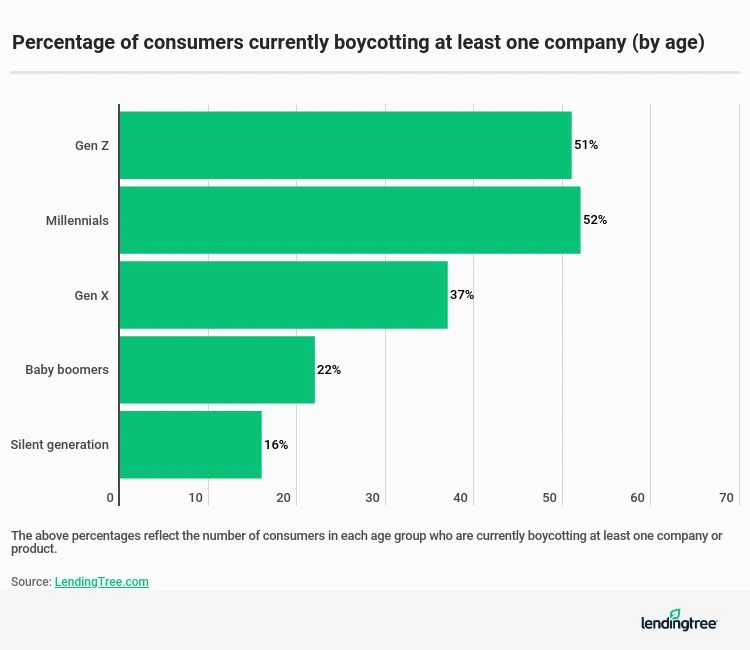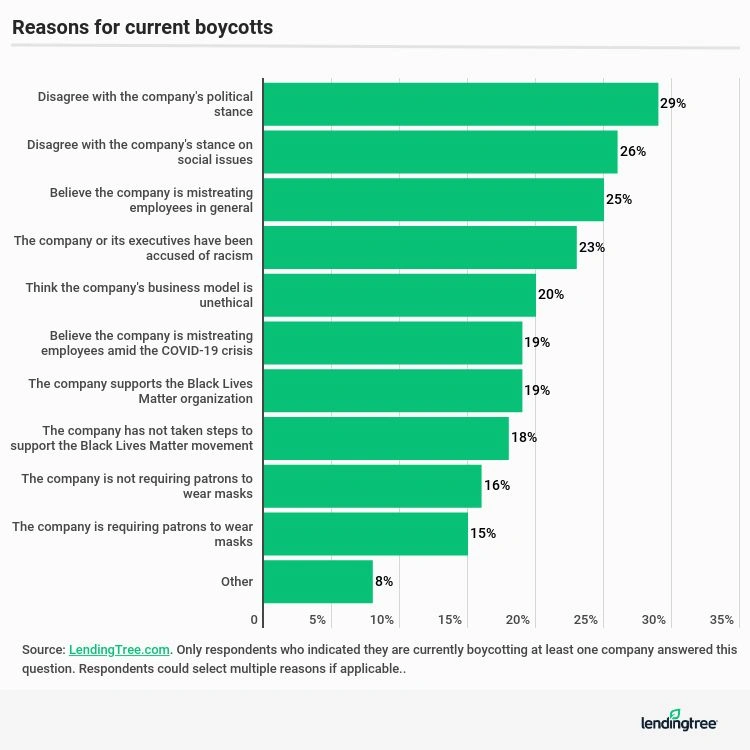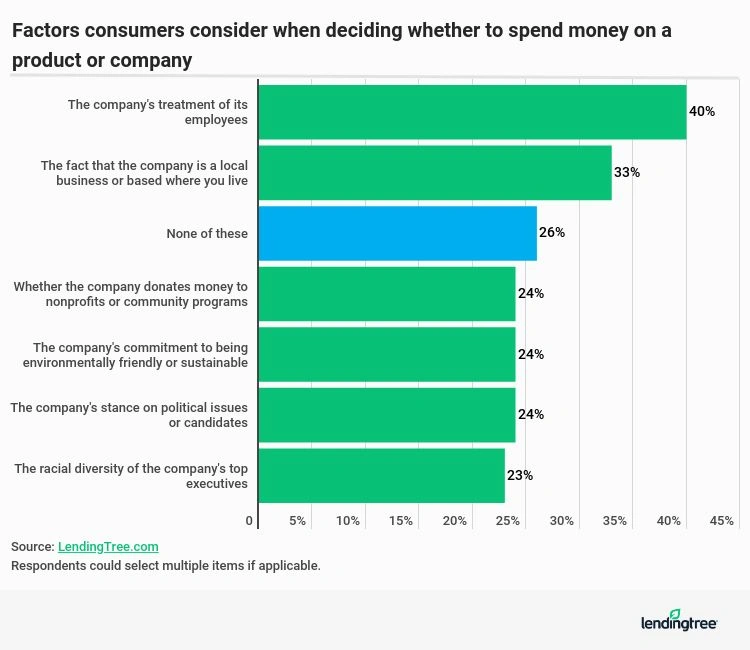38% of Americans Are Currently Boycotting a Company, and Many Cite Political and Coronavirus Pandemic-Related Reasons
In business they say the customer is always right. For some consumers, that statement not only applies to customer service, but also describes their ideology on political and social issues.
A substantial percentage of consumers who feel that a company is behaving wrongly are willing to boycott that business, according to a new report from LendingTree.
The current coronavirus pandemic and recent protests against social injustice have given consumers even more of an incentive to express their disapproval with various businesses as they are among the reasons 38% of consumers are currently boycotting at least one company, up from 26% in 2019.
To gauge how far consumers would go to express their dissatisfaction with a company, LendingTree asked Americans whether they would boycott a company they had frequented in the past and what would make them do so. We asked what companies consumers were boycotting, whether they believed boycotts were effective and found that consumers see boycotts as a powerful catalyst for change as long as these tactics are used sparingly.
- About 38% of consumers are currently boycotting at least one company. This is up from January 2019 when 26% of consumers were boycotting one or more companies. The No. 1 reason for the boycotts: disagreements about politics.
- The survey found that 1 in 4 boycotting consumers said they believe the company is mistreating employees in general, and 19% think the company is treating its workers unfairly specific to the coronavirus pandemic. Overall, 40% of consumers said a company’s treatment of its employees plays a role in their decision to spend money on a particular product or business.
- Nearly a quarter (23%) of boycotting consumers said the company they’re refusing to patronize has been accused of racism. A similar number of consumers said the diversity of a company’s executive suite factors into their decision to spend money with that company.
- The Black Lives Matter movement and mask requirement create nearly an even split among many boycotting consumers. 19% of boycotting consumers are refusing to spend money with a company due to its support for the Black Lives Matter organization, while 18% are boycotting companies that do not support the movement. At the same time, 16% are withholding dollars from businesses that don’t require shoppers to wear masks, but 15% are boycotting places that do require patrons to don face coverings.
- Likelihood to boycott decreases with age. About half of Gen Z (51%) and millennials (52%) are currently boycotting at least one company, but that number drops slightly for Gen X (37%) and greatly for baby boomers (22%) and the silent generation (16%).
- More than half (53%) of Americans said they’re more likely to buy from a company that gives to charities or is associated with causes they believe in. And, 41% said they would cut ties with their favorite retailer if it publicly supported something or someone they strongly disagreed with.
Nearly 4 in 10 consumers are currently boycotting a company
For consumers in the age of the COVID-19 crisis, patience with big business is not a virtue. When asked if they were currently boycotting a company they had spent money with in the past, nearly 4 in 10 (38%) of respondents said yes. Of those respondents, 22% said they were currently boycotting multiple companies and 16% had one company in their crosshair.

While 38% of respondents said they have not boycotted any companies in the past year, they would not rule out doing so under the right circumstances. In fact, 38% of respondents said they believe it is their responsibility to withhold their dollars from companies whose values or actions are not in alignment with their own.
However, 1 in 4 respondents said they don’t believe in boycotts, proving the practice is not for everybody.
Gender, age and income differences among boycotters – but not political affiliation
Younger consumers are more willing to use their dollars to make their preferences known.
While 51% of Gen Z consumers and 52% of millennials said they were currently boycotting a company, only 37% of Gen Xers, 22% of baby boomers and 16% of the silent generation said they were participating in a boycott.

Another recent LendingTree survey suggested Gen Z and millennials were also more likely than other generations to put their money behind their favorite political candidates and donate to a political campaign.
Income also plays a role in one’s likelihood to boycott with higher earners nearly twice as likely to hold back dollars to make a statement. In fact, 53% of those in households earning $100,000 or more said they were currently boycotting a company compared to 28% of those with a household income below $25,000.
The fact that higher earners are more likely to boycott than others should certainly catch the attention of businesses, says Matt Schulz, chief consumer finance analyst for LendingTree.
“It’s one thing if a bunch of people with minimal buying power choose to boycott your company. It’s a completely different thing – and much more concerning financially – if the folks with the most money to spend, decide to boycott. That can take a much bigger total on the bottom line,” said Schulz.
There also appears to be a gender divide when it comes to taking a stance. Men are much more likely to be boycotting right now, with 49% of men boycotting one or more companies compared to 28% of women.
While many consumers are boycotting companies because they disagree with their political stance, members of one major political party weren’t much more likely to boycott than the other. In fact, 41% of Republicans are currently boycotting one or more companies compared to 40% of Democrats. Independents are slightly less likely to boycott, as just 36% are refusing to spend money on a company.
Treatment of workers, political beliefs, among top boycott reasons
So what is making consumers get worked up enough to boycott?
The largest percentage currently boycotting (29%) are doing so because they disagree with the company’s political stance. “America is as polarized and politicized as it has ever been, and Americans often want to make a statement with what they watch, where they go and who they listen to. Millions of Americans are simply no longer willing to support a business that doesn’t align with their values,” said Schulz.
Some business policies are so polarizing that they are inspiring boycotts both for and against a particular issue.
When it comes to companies showing support for the Black Lives Matter movement,19% of survey respondents are boycotting a company because it supports Black Lives Matter while 18% are boycotting a company because it does not support the movement.
A company’s policy on the use of masks amidst the pandemic is another motivator for boycotts on both sides of the issue. In fact, 16% of respondents are boycotting a company because it is not requiring customers to wear masks, while 15% are boycotting a company because it is requiring masks.

Companies’ public stances and ethics matter to most
Even if consumers are otherwise happy with a company, many will turn their backs if the company treats its employees poorly or takes a public stance they don’t agree with.
When asked what plays a role in their financial support of a product or company, more than a third (40%) said the company’s treatment of its employees factors into their decision. Some are looking at whether a company gives diverse employees opportunities to advance. In fact, 23% said the racial diversity of the company’s top executives matters.
With the BLM movement shining a light on social injustice, 23% of consumers said they have taken proactive steps to shop from Black-owned brands within the past 60 days. Millennials were most likely to do this, with 37% saying they have patronized a Black-owned brand in the last two months.
More than a third (34%) of consumers said that while they have shopped as they normally do in recent weeks, they are open to patronizing Black-owned brands in the future.
When asked about other factors that play into consumers’ willingness to spend money with a company:
- 33% said whether the place is a local business or headquartered where they live
- 24% said the company’s commitment to being environmentally friendly or sustainable
- 24% said the company’s stance on political issues or candidates
- 24% said whether the company donates to nonprofits or participates in community outreach
Slightly more than a quarter (26%) said none of the factors listed above influence their decision to patronize a particular business.

Nearly half (48%) of consumers have spent money on a product or company in the past year specifically because the company supported a cause or person they strongly agreed with. That’s especially true for millennials (65%) and those earning more than $100,000 per year (62%).
Also, 53% of respondents said they were more likely to buy from a company that gives to charities or supports causes they believe in.
On the other hand, some respondents would stop spending money with companies that support a cause or person they are not on board with. For example, 41% of credit cardholders said they would stop using their favorite card if the card issuer publicly supported a person or cause the cardholder strongly disagreed with. Such an action could even cost consumers money, particularly if they receive generous rewards by using that card.
Also, 41% said they would cut ties with their favorite retailer if it publicly supported something or someone they strongly disagreed with.
The bottom line
Consumers understand their dollars have power and are willing to withhold them from companies who mistreat employees and don’t share their political views. More than half of respondents (57%) said boycotts are an effective way to bring about change, but only when they aren’t executed too often. In fact, 54% said people can be too quick to recommend a boycott.
“We’re a divided country in so many ways and people seem to be becoming more emboldened in their beliefs and more willing to use their wallets to express them,” said Schulz.
Methodology
LendingTree commissioned Qualtrics to conduct an online survey of 1,026 Americans, with the sample base proportioned to represent the overall population. The survey was fielded July 10-13, 2020.
Generations are defined as the following ages in 2020:
- Gen Z are ages 18-23
- Millennials are ages 24-39
- Gen X are ages 40-54
- Baby boomers are ages 55-74
- Silent generation are ages 75 and older
